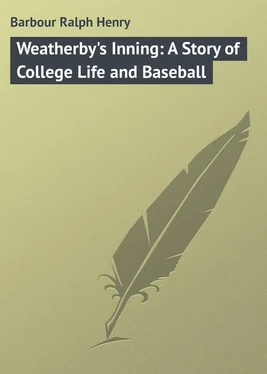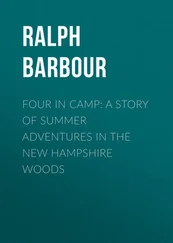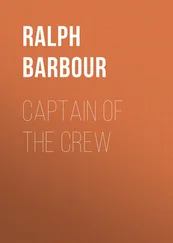Ralph Barbour - Weatherby's Inning - A Story of College Life and Baseball
Здесь есть возможность читать онлайн «Ralph Barbour - Weatherby's Inning - A Story of College Life and Baseball» — ознакомительный отрывок электронной книги совершенно бесплатно, а после прочтения отрывка купить полную версию. В некоторых случаях можно слушать аудио, скачать через торрент в формате fb2 и присутствует краткое содержание. Издательство: Иностранный паблик, Жанр: foreign_prose, foreign_children, на английском языке. Описание произведения, (предисловие) а так же отзывы посетителей доступны на портале библиотеки ЛибКат.
- Название:Weatherby's Inning: A Story of College Life and Baseball
- Автор:
- Издательство:Иностранный паблик
- Жанр:
- Год:неизвестен
- ISBN:нет данных
- Рейтинг книги:5 / 5. Голосов: 1
-
Избранное:Добавить в избранное
- Отзывы:
-
Ваша оценка:
- 100
- 1
- 2
- 3
- 4
- 5
Weatherby's Inning: A Story of College Life and Baseball: краткое содержание, описание и аннотация
Предлагаем к чтению аннотацию, описание, краткое содержание или предисловие (зависит от того, что написал сам автор книги «Weatherby's Inning: A Story of College Life and Baseball»). Если вы не нашли необходимую информацию о книге — напишите в комментариях, мы постараемся отыскать её.
Weatherby's Inning: A Story of College Life and Baseball — читать онлайн ознакомительный отрывок
Ниже представлен текст книги, разбитый по страницам. Система сохранения места последней прочитанной страницы, позволяет с удобством читать онлайн бесплатно книгу «Weatherby's Inning: A Story of College Life and Baseball», без необходимости каждый раз заново искать на чём Вы остановились. Поставьте закладку, и сможете в любой момент перейти на страницу, на которой закончили чтение.
Интервал:
Закладка:
Weatherby's Inning: A Story of College Life and Baseball
CHAPTER I
COWARD!
University Baseball. – All men who wish to try for the team report in the cage on Monday, February 25th, at 3.30 sharp.
Jos. L. Perkins, Capt.Jack Weatherby, on his way out of the gymnasium, paused before the bulletin-board in the little drafty hall and read the call.
“That’s next Monday,” he muttered. “All right, I’ll be there.”
Then, putting a shoulder against the big oak door, he pushed his way out on to the granite steps and stood there a moment in scowling contemplation of the cheerless scene. Before him the board-walk was almost afloat in a shallow rivulet of melted snow that filled the gravel-path from side to side. A few steps away the path ended at the Washington Street gate in a veritable lake. The crossing was inches deep in water and the Common was a dismal waste of pools and streams out of which the soldiers’ monument reared itself as though agonizedly searching for a dry spot to which to move. There was an incessant and monotonous dripping and trickling and gurgling as the snow, which two days before had covered the ground to a depth of over a foot, disappeared as by magic under the breath of an unseasonable south wind. The sky was leaden and lowering, and against it the bare branches of the numberless elm-trees swayed complainingly. The Common and so much of the college grounds as was in sight were deserted. Altogether it was a dispiriting prospect that met Jack’s eyes, and one little likely to aid him in the task of fighting the “blues,” which had oppressed him all day.
He went listlessly down the steps, heroically striving to whistle a tune. But the tune had died out ere the sidewalk was reached. He looked with misgiving from the crossing to his shoes – shoes which even when new had been scarcely adapted to wet weather – and after a moment of hesitation gave up the idea of taking the usual short cut across the Common, and went on down Washington Street. As he began to pick his way gingerly across the wet pavement at the corner of Elm Street, two men ran down the steps of a boarding-house. They were talking in high, excited tones, and Jack could hear them until they had gone some distance toward the railroad.
“The water’s away up to the road, they say,” one of them declared loudly, “and it’s still rising. They’re afraid the bridge’ll go. There’s a lot of ice coming down.”
“Should think it might go,” said the other. “The old thing looks as though you could push it over if you tried.”
“Yes, don’t it? Let’s get a move on. We had a flood once up home that – ”
Then a heavy gust of wind, sweeping around the corner of the tumble-down livery-stable, drowned the conversation. Jack paused and silently weighed the respective attractions of a dark and not overcomfortable room in the green-shuttered house a few steps away, and a swollen river which might, if there was any such thing as good luck – which he had begun to doubt – sweep away the tottering old wooden bridge. Well, his feet were already wet, and so – He retraced his steps to the corner and went on down Washington Street in the wake of the others. They were a block or so ahead, splashing their thick boots through all kinds of puddles. They were evidently the best of friends, for one kept his hand on the other’s shoulder. Once the prankish wind bore a scrap of merry laughter up the street, and Jack, plodding along behind, wary of puddles, as befits a fellow who is wearing his only pair of winter shoes, heard it and felt gloomier and more forlorn than ever.
He wondered what it was like to have real friends and a chum; to be well known and liked. He had come to Erskine College in September fully expecting such things to fall to his share. But he had been there five months now and during that time his life had been very lonely. At first he had tried to make friends in a diffident way. Perhaps he had tried with the wrong men; perhaps his manner had been against him; the result had been discouraging, and after a while, smarting under what to his oversensitive feelings seemed rebuffs, he had ceased looking for friends and had retired into a shell of pessimism and injured pride, masking his loneliness under simulated indifference. Since then he had undoubtedly lost many a chance to find the companionship he craved; but he had learned his lesson, he told himself bitterly, and so he rejected advances as though they were the deadliest of insults.
He didn’t look the least bit like a misanthrope. He was seventeen years old, large for his age, lithe, muscular and healthy-looking, as is proper in a boy who has never been pampered, with a face which even at the present moment, in spite of the expression of settled bitterness that marred it, was eminently attractive. His eyes were well apart and gray in color; his hair was light brown, and his mouth, which of late had formed the unfortunate habit of wearing a little supercilious sneer in public, looked generous and honest, and, with the firmly rounded chin beneath, suggested force and capability. On the whole he was a clean-cut, manly-looking boy to whom fortune, you would have said, owed much.
When Jack Weatherby reached the river he found that the report of its depredations was not exaggerated. To be sure, River Street was still above water, but the flood was well over the bank in places, and farther along, in front of the coal-yards, several of the wharves were awash. The broad stream, usually a quiet, even sluggish body, was sending up a new sound, a low, threatening roar which, without his having realized it, had reached Jack’s ears long before he had sighted the river.
He wormed his way through the crowd of townfolk that lined the street, and, passing through an empty coal-pocket, found himself on a spray-drenched string-piece a foot above the water. To his right and left piers ran some distance into the river. They were untenanted. But beyond them the open spaces used by the coal company as storage ground for wagons were black with watchers. A short way off was the bridge, a low, wooden structure connecting Centerport with the little village of Kirkplain across the river. Jack was on the up-stream side of the bridge and could see the havoc that the drifting ice was making with the worn spiling and hear the crashing and grinding as cake after cake was hurled and jammed against it. Several of the supports were already broken, and the entrance to the bridge was barred with a rope and guarded by a member of Centerport’s small police force.
Jack drew back as far as he could from the edge of the beam and with his shoulders against the boards of the big bin watched in strange fascination the black, angry water rushing past. It frightened and repelled him, and yet he found it difficult to remove his gaze. For as long as he could remember he had been afraid of water. Once, when he was only five years old, he had fallen into the brook that crossed his father’s farm and had almost drowned before his mother, hastening after the runaway, had dragged him out. His recollection of the escapade was very hazy, but it had left him with a dread of water that was almost a mania. All efforts to combat it had proved futile. He had never learned to swim, and had never in all his life trusted himself in a boat. And yet, as a boy, he had devoured ravenously all the stories of the sea he could lay hands on, and had shuddered over shipwrecks and similar disasters, at once repelled and fascinated.
Suddenly his contemplation of the river was disturbed by shouts of alarm from up-stream. With an effort he withdrew his gaze from the water and looked in the direction of the cries. At that instant, around the corner of the pier to his right, floated something that thrashed the water wildly and sent up shrill appeals for help.
Читать дальшеИнтервал:
Закладка:
Похожие книги на «Weatherby's Inning: A Story of College Life and Baseball»
Представляем Вашему вниманию похожие книги на «Weatherby's Inning: A Story of College Life and Baseball» списком для выбора. Мы отобрали схожую по названию и смыслу литературу в надежде предоставить читателям больше вариантов отыскать новые, интересные, ещё непрочитанные произведения.
Обсуждение, отзывы о книге «Weatherby's Inning: A Story of College Life and Baseball» и просто собственные мнения читателей. Оставьте ваши комментарии, напишите, что Вы думаете о произведении, его смысле или главных героях. Укажите что конкретно понравилось, а что нет, и почему Вы так считаете.












